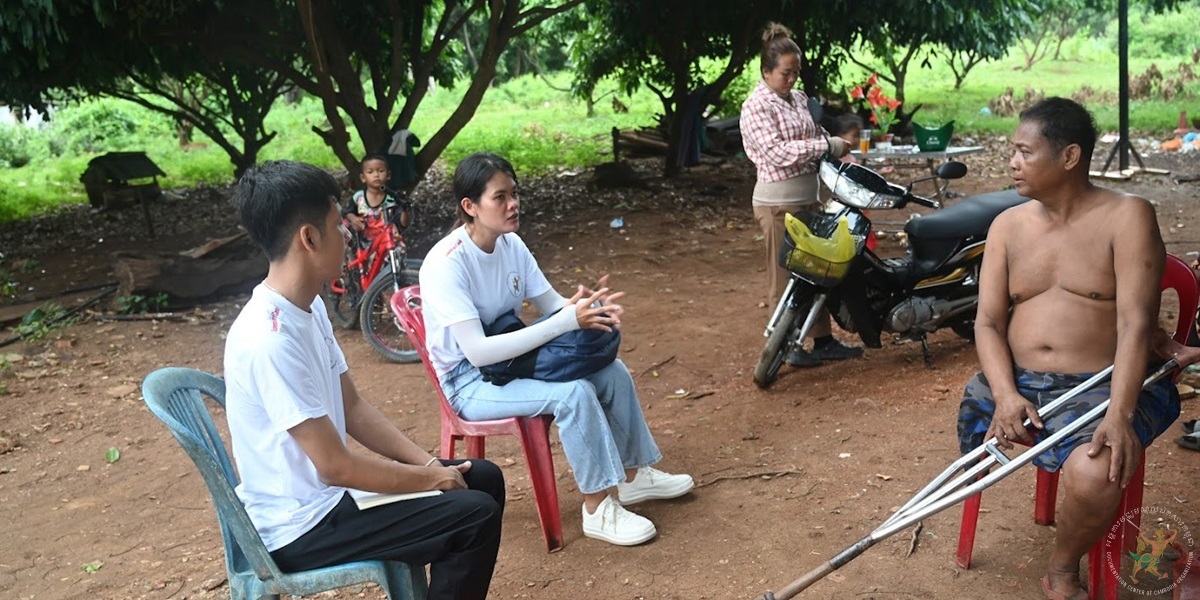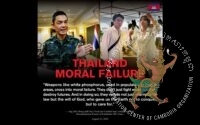HEALTH AND WELFARE OF THE SURVIVORS OF THE KHMER ROUGE

REPORT STUDY CONDUCTED AUGUST 2021 – AUGUST 2022: HEALTH AND WELFARE OF THE SURVIVORS OF THE KHMER ROUGE
For over two decades, The Documentation Center of Cambodia (DC-Cam) has been surveying the survivors of the Khmer Rouge regime to develop a better understanding of survivor needs, interests and perspectives. Thanks to a generous grant from the United States Agency for International Development (USAID) in the summer of 2021, DC-Cam has been able to significantly expand its efforts in this area, particularly as it relates to developing a better understanding of the health and welfare conditions of survivors and establishing its volunteer youth leadership corps dedicated to this endeavor—CamboCorps—which is inspired from the United States AmeriCorps. As of August 2022, DC-Cam has collected information from over 31,000 Khmer Rouge survivors, and the following reflects observations and analysis of this work.
DC-Cam is also inspired by the “Pentagonal Strategy” of the new Cambodian Prime Minister Samdech Moha Borvor Thipadei Hun Manet and the public health strategy of recently appointed Cambodian Minister of Health, the Honorable, Chheang Ra. Prime Minister Manet’s Pentagonal Strategy outlines five guarantees that are laid out across six priority policy programmes. The first part of the Pentagonal Strategy is human capital development, which focuses on education, technical skills, health, social protection, food system and equity based on the spirit of “leaving no Cambodian citizen behind.” DC-Cam sees the Pentagonal Strategy as a prudent and extremely important step forward in balancing Cambodia’s rapid development with an equally important prioritization of the people at the grassroots level, who are the heart and soul of Cambodia. The first policy programme also involves the expansion of healthcare services towards the goal of providing universal health coverage. DC-Cam endorses this policy initiative (among others presented) because healthcare is one of the greatest priorities and needs of Cambodia’s “Greatest Generation”—the survivors of the Khmer Rouge era.
The health dimensions of the Pentagonal Strategy and the six priority policy programmes inform the vision of the Honorable Chheang Ra, Cambodian Minister of Health, who is committed to improving the ethics of doctors in Cambodia and earning the public’s trust in Cambodia’s public and private health services. Minister Ra has encouraged doctors to improve their communication with local people and support the modernization of public health services, including the regulation of private health services. Together, Prime Minister Manet’s strategy and set of policy programmes and Minister Ra’s vision for a modernized Cambodian health system are expected to improve the quality of lives of Cambodians today and for generations to come. DC-Cam looks forward to supporting these national-level objectives through research, education, and direct action programmes.
Perhaps unsurprisingly, DC-Cam has found most Khmer Rouge survivors who took part in its survey cited financial circumstances to be the primary reason for not seeking treatment for mental or physical health conditions, disabilities, or ailments. DC-Cam also found that among the physical or mental health conditions reported by survivors, hypertension, and gastrointestinal disorders, followed by malaria, mental illness, and heart disease, were, in this order, the most important health concerns and debilitating conditions for survivors. While DC-Cam has more work to do in developing an understanding of these issues, it is notable that these conditions also coincide with survivors’ reported mental health conditions and concerns from their experiences under the Khmer Rouge regime. Eighty-seven percent of survivors who were surveyed by DC-Cam reported having troubling memories of the Khmer Rouge period that resonated with them to-date, and 25 percent of respondents reported still suffering nightmares of this period, even though these experiences occurred over forty years ago.
Finally, DC-Cam found that medication, as opposed to visits to a public or private healthcare provider or hospital, is the primary method used for treatment in lingering or unexpected medical care needs. Survivors’ reliance on medicine to meet medical care needs may indicate that, rather than financial resources alone, one’s access to care may also be greatly influenced by other overlapping geographic or socio-organizational conditions of accessibility.
Access can be conceptualized in different ways—from the distribution of medical services, resources, and facilities to the external characteristics of a population, such as in insurance coverage, attitudes to medical care, and income. It is possible that improving access, and consequently improving the health and welfare of survivors of atrocity crimes, may be less a matter of addressing the financial circumstances of survivors, and more a question about how to make medical care more convenient, trusted, and reliable.
DC-Cam’s research in this area is ongoing because DC-Cam continues to receive new survey and observational data under this project. For these reasons, these findings remain preliminary in nature; however, they raise many questions and implications that bear significant relevance for ongoing and potential future work with the survivor community in Cambodia and in other post-conflict countries.
Many survivors will pass away in the next five to ten years as many reach 70 years old or older. Because the life expectancy of Cambodians in general is approximately 70 years of age, unless we continue to dedicate resources and attention to collecting the oral history of this generation of survivors, we risk losing pieces of this history forever.
As DC-Cam continues its work in this area, we look forward to sharing our findings and recommendations with the public, not only to shine light on the plight, challenges, and barriers of access to essential health and social services for the survivors of the Khmer Rouge, but also where improvements can be made in the international community’s conceptualization of justice for survivors of atrocity crimes in all post-conflict societies around the world.
Key findings
1) Cambodian survivors predominantly identify as poor, unemployed or employed in occupations of relatively low wages (particularly agriculture).
2) Women represented a higher percentage of the respondents across all age groups.3 3) Cambodian survivors predominantly attributed any illness, disease, or ailment they are suffering to old age.
4) Survivor communities appear to be concentrated in the Tonle Sap Lake and Plains regions of Cambodia.
5) Hypertension, gastrointestinal disorders, and mental illness stood out as the most reported, potential health conditions that could have been directly or indirectly associated with life under the Khmer Rouge regime.
6) A notable percentage of survivors (at least 1 out of 4 respondents in this study) are reported to still suffer from some type of mental health condition or symptom that can be attributed to experiences under the Khmer Rouge.
7) Medication, as opposed to visits to a public or private healthcare provider or hospital, is the primary method used for treatment by survivors in lingering or unexpected medical care needs.
8) The majority of survivors received a COVID-19 vaccination; however, the fact that the older the generation of survivors, the reduced likelihood they received a vaccine raises an untested hypothesis that the older the generation the greater the challenge in providing new information, medicine or treatment.
Recommendations
1) Actions, policies, or programmes aimed at addressing or offsetting the cost of medical care for survivors should be explored for purposes of improving survivors’ access to medical care.
2) Actions, policies, or programmes aimed at addressing or supporting the support networks of survivors will also improve survivors’ access to care for survivors, particularly in remote and/or marginalized populations.
3) Because women represented a higher percentage of the respondents across all age groups, there may be a potential need for greater attention to sex- and gender-sensitive care, resources, and support services for survivors.
4) There is a need for greater attention to information, services, and resources that support healthy behaviors and routines among survivors.
5) Future direct action or research programmes targeting survivor communities can target the Tonle Sap Lake and Plains regions of Cambodia; although, other areas of Cambodia, such as the Anlong Veng region, present possibilities for further research.
6) There is a need for greater attention to information, services, and resources that support mental health among survivors and their families.
Published on September 19, 2023




